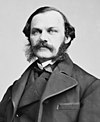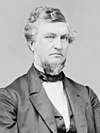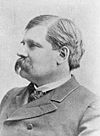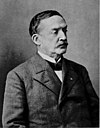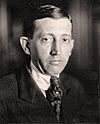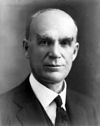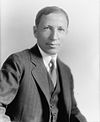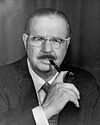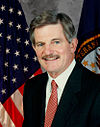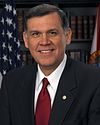The Republican National Committee (RNC) is the primary committee of the Republican Party of the United States. Its members are chosen by the state delegations at the national convention every four years.[3] It is responsible for developing and promoting the Republican brand and political platform, as well as assisting in fundraising and election strategy.[4] It is also responsible for organizing and running the Republican National Convention. When a Republican is president, the White House controls the committee. According to Boris Heersink, "political scientists have traditionally described the parties' national committees as inconsequential but impartial service providers."[5][6]
 | |
| Founded | June 1856; 168 years ago |
|---|---|
| Location |
|
Key people |
|
| Affiliations | Republican Party |
| Website | www |
Similar committees exist in every U.S. state and most U.S. counties, although in some states party organization is structured by congressional district, allied campaign organizations being governed by a national committee. Michael Whatley is the current committee chairman.[7]
The Democratic Party's counterpart to the RNC is the Democratic National Committee.
History
The 1856 Republican National Convention appointed the first RNC. It consisted of one member from each state and territory to serve for four years. Each national committee since then has followed the precedent of equal representation for each state or territory, regardless of population. From 1924 to 1952, there was a national committeeman and national committeewoman from each state and U.S. possession, and from Washington, D.C. In 1952, committee membership was expanded to include the state party chairs of states that voted Republican in the preceding presidential election, have a Republican majority in their congressional delegation (U.S. representatives and senators), or have Republican governors. By 1968, membership reached 145. As of 2011, the RNC has 168 members.[8]
While a number of the chairs of the RNC have been state governors, the only person to have chaired the RNC and later become U.S. president is George H. W. Bush. During Bush's time as RNC chair, Spiro Agnew was being investigated for corruption, which would later lead to Agnew's resignation as vice president. Bush assisted, at the request of Nixon and Agnew, in getting John Glenn Beall Jr., the U.S. Senator from Maryland, to pressure his brother, George Beall the U.S. Attorney in Maryland, to shut down the investigation into Agnew. Attorney Beall ignored the pressure.[9]
In 2013, the RNC began an outreach campaign towards the American youth and minority voters, after studies showed these groups generally perceived that the Republican Party did not care about their concerns.[10]
During the presidency of Donald Trump, the RNC showed staunch loyalty to President Trump, even at times when prominent Republicans did not. Under Ronna McDaniel's leadership, the RNC ran ads for Trump's 2020 campaign as early as 2018, put numerous Trump campaign workers and affiliates on the RNC payroll, spent considerable funds at Trump-owned properties, covered his legal fees in the Russian interference investigation, hosted Trump's Fake News Awards, and criticized Trump critics within the Republican Party.[11] Two days after the January 6th riot at the Capitol following the controversial 2020 presidential election results, the RNC held an event where members expressed loyalty to the President.[12]
In February 2022, the RNC censured two Republican representatives, Liz Cheney of Wyoming and Adam Kinzinger of Illinois, for their participation in the United States House Select Committee to Investigate the January 6 Attack on the US Capitol; the censure statement described the committee as a "Democrat-led persecution of ordinary citizens who engaged in legitimate political discourse."[13] The censure of sitting congressmembers, and particularly the description of the January 6 events as "legitimate political discourse", received bipartisan criticism from politicians and media.[14][15]
Role
The Republican National Committee's main function is to assist the Republican Party of the United States. It helps to promote the Republican political platform and the "party brand" or image. It helps coordinate fundraising and election strategy.
It is also responsible for organizing and running the Republican National Convention.
According to Jim Nicholson, a former chairman of the Republican National Committee:
“The party can’t coordinate with these Super PACs and neither can the campaigns so there’s a lot more chaos . . . .And the party structure clearly has a diminished role because they don’t have the resources they used to have.”[16]
Organization
The current chair of the Republican National Committee is Michael Whatley, since March 8, 2024. Whatley was previously chair of the North Carolina Republican Party from 2019 to 2024.[17][18]
The previous chair of the Republican National Committee was Ronna McDaniel, serving from 2017 to 2024. McDaniel was chair of the Michigan Republican Party from 2015 to 2017.[19]
In January 2019, Thomas O. Hicks Jr. was elected co-chairman of the RNC. Hicks has a strong connection to former President Trump's campaigns and policy initiatives, having served as chairman of the America First Action PAC and America First Policies, and as national finance co-chairman for Donald J. Trump for President.[19]
Similar committees to the RNC exist in each U.S. state and most U.S. counties. The RNC also organizes volunteer groups for specific interests, such as the Black Republican Activists, GOP Hispanics, RNC Women (not to be confused with National Federation of Republican Women), GOP Faith, Asian Pacific Americans, Young Leaders and Veterans & Military Families.[19]
Other national leaders
- Treasurer: Kristin Crosbie, also on the RNC Executive Committee and Rules Committee
- Secretary: Vicki Drummond
- General Counsel: Michael Whatley
- Senate Republican Leader: Mitch McConnell
- Senate Republican Whip: John Thune
- Senate Republican Conference Chair: John Barrasso
- Senate Republican Policy Committee Chair: Joni Ernst
- Senate Republican Conference Vice Chairwoman: Shelley Moore Capito
- National Republican Senatorial Committee Chair: Steve Daines
- House Republican Conference Leader: Mike Johnson
- House Republican Floor Leader: Steve Scalise
- House Republican Whip: Tom Emmer
- House Republican Conference Chairwoman: Elise Stefanik
- House Republican Policy Committee Chairman: Gary Palmer
Chairs of the Republican National Committee
Elections
1993 election
| Candidate | Round 1 | Round 2 | Round 3 |
|---|---|---|---|
| Haley Barbour | 60 | 66 | 90 |
| Spencer Abraham | 47 | 52 | 57 |
| Bo Callaway | 22 | 19 | 18 |
| John Ashcroft | 26 | 20 | Withdrew |
| Craig Berkman | 10 | 8 | Withdrew |
- Candidate won majority of votes in the round
- Candidate secured a plurality of votes in the round
- Candidate withdrew
1997 election
| Candidate | Round 1 | Round 2 | Round 3 | Round 4 | Round 5 | Round 6 |
|---|---|---|---|---|---|---|
| Jim Nicholson | 23 | 30 | 38 | 65 | 74 | * |
| David Norcross | 41 | 46 | 47 | 50 | 47 | Withdrew |
| Steve Merrill | 42 | 42 | 43 | 46 | 43 | Withdrew |
| John S. Herrington | 4 | 4 | 3 | 3 | Withdrew | - |
| Tom Pauken | 22 | 24 | 21 | Withdrew | - | |
| Chuck Yob | 17 | 18 | 12 | Withdrew | - | |
| Robert T. Bennett | 15 | Withdrew |
- Candidate won majority of votes in the round
- Candidate secured a plurality of votes in the round
- Candidate withdrew
- Merrill and Norcross both dropped out after the fifth round, giving the chairmanship to Nicholson by acclamation.
2009 election
On November 24, 2008, Steele launched his campaign for the RNC chairmanship with the launching of his website.[24] On January 30, 2009, Steele won the chairmanship of the RNC in the sixth round, with 91 votes to Dawson's 77.[25]
Source: CQPolitics,[26] and Poll Pundit.[27]
| Candidate | Round 1 | Round 2 | Round 3 | Round 4 | Round 5 | Round 6 |
|---|---|---|---|---|---|---|
| Michael Steele | 46 | 48 | 51 | 60 | 79 | 91 |
| Katon Dawson | 28 | 29 | 34 | 62 | 69 | 77 |
| Saul Anuzis | 22 | 24 | 24 | 31 | 20 | Withdrew |
| Ken Blackwell | 20 | 19 | 15 | 15 | Withdrew | - |
| Mike Duncan | 52 | 48 | 44 | Withdrew |
- Candidate won majority of votes in the round
- Candidate secured a plurality of votes in the round
- Candidate withdrew
On announcing his candidacy to succeed RNC Chairman Duncan, former Maryland Lt. Gov. Michael Steele described the party as being at a crossroads and not knowing what to do. "I think I may have some keys to open the door, some juice to turn on the lights," he said.[28]
Six people ran for the 2009 RNC Chairmanship: Steele, Ken Blackwell, Mike Duncan, Saul Anuzis, Katon Dawson and Chip Saltsman. After Saltsman's withdrawal, there were only five candidates during the hotly contested balloting January 30, 2009.
After the third round of balloting that day, Steele held a small lead over incumbent Mike Duncan of Kentucky, with 51 votes to Duncan's 44. Shortly after the announcement of the standings, Duncan dropped out of contention without endorsing a candidate.[29] Ken Blackwell, the only other African-American candidate, dropped out after the fourth ballot and endorsed Steele, though Blackwell had been the most socially conservative of the candidates and Steele had been accused of not being "sufficiently conservative." Steele picked up Blackwell's votes.[30] After the fifth round, Steele held a ten-vote lead over Katon Dawson, with 79 votes, and Saul Anuzis dropped out.[31] After the sixth vote, he won the chairmanship of the RNC over Dawson by a vote of 91 to 77.[32]
Mississippi Governor and former RNC chair Haley Barbour has suggested the party will focus its efforts on congressional and gubernatorial elections in the coming years rather than the next presidential election. "When I was chairman of the Republican National Committee the last time we lost the White House in 1992 we focused exclusively on 1993 and 1994. And at the end of that time, we had both houses of Congress with Republican majorities, and we'd gone from 17 Republican governors to 31. So anyone talking about 2012 today doesn't have their eye on the ball. What we ought to worry about is rebuilding our party over the next year and particularly in 2010," Barbour said at the November 2008 Republican Governors conference.[33]
2011 election

Michael Steele ran for re-election at the 2011 RNC winter meeting.[34] Other candidates were Reince Priebus, Republican Party of Wisconsin Chairman, Ann Wagner, former Ambassador to Luxembourg, Saul Anuzis, former Republican Party Chairman of Michigan, and Maria Cino, former acting Secretary of Transportation under George W. Bush. Steele's critics increasingly called on him to step down as RNC Chair when his term ended in 2011. A debate for Chairman hosted by Americans for Tax Reform took place on January 3 at the National Press Club.[35][36] The election for Chairman took place January 14 at the RNC's winter meeting with Reince Priebus winning on the seventh ballot after Steele and Wagner withdrew.
| Candidate | Round 1 | Round 2 | Round 3 | Round 4 | Round 5 | Round 6 | Round 7 |
|---|---|---|---|---|---|---|---|
| Reince Priebus | 45 | 52 | 54 | 58 | 67 | 80 | 97 |
| Saul Anuzis | 24 | 22 | 21 | 24 | 32 | 37 | 43 |
| Maria Cino | 32 | 30 | 28 | 29 | 40 | 34 | 28 |
| Ann Wagner | 23 | 27 | 32 | 28 | 28 | 17 | Withdrew |
| Michael Steele | 44 | 37 | 33 | 28 | Withdrew |
- Candidate won majority of votes in the round
- Candidate secured a plurality of votes in the round
- Candidate withdrew
2013–2023 elections
Priebus won re-election with near unanimity in the party's 2013 meeting in Charlotte, North Carolina.[37] He was re-elected to a third term in 2015, setting him up to become the longest serving head of the party ever.[38]
After winning in November 2016, President-elect Donald Trump designated Priebus as his White House Chief of Staff, to begin upon his taking office in January 2017; David Bossie of Maryland was seen as a potential next RNC chairman.[39]
Trump then recommended Ronna Romney McDaniel as RNC Chairwoman and she was elected to that role by the RNC in January 2017. McDaniel was re-elected in 2019 and 2021.[40] Mike Lindell announced that he would challenge McDaniel in 2023. Lindell accused McDaniel of not denying the legitimacy of the 2020 presidential election forcefully enough, and criticized her for presiding over the RNC during three disappointing election years.[41] McDaniel was re-elected in to a fourth term in January 2023, easily defeating Lindell and California RNC committeewoman Harmeet Dhillon.[42]
| Candidate | Round 1 |
|---|---|
| Ronna McDaniel | 111 |
| Harmeet Dhillon | 51 |
| Mike Lindell | 4 |
| Lee Zeldin | 1 |
Candidate won majority of votes in the round
2024 election
On February 6, 2024, The New York Times reported that McDaniel intended to resign after the South Carolina Republican presidential primary held on February 24, 2024, following dissatisfaction from former president Donald Trump, who publicly supported North Carolina Republican Party chair Michael Whatley.[43][44]
McDaniel confirmed these reports when, on February 26, 2024, she and Drew McKissick announced their resignations as chair and co-chair of the RNC effective on March 8, 2024.[45] Later that same day, Micheal Whatley, chair of the North Carolina Republican Party, announced that he would seek the position of RNC chair.
Lara Trump, daughter-in-law of former president Donald Trump, also announced on February 28 that she would seek to succeed McKissick as co-chair of the RNC.[46] Both Whatley and Trump gained the endorsement of former President Trump.
Whatley and Trump were both elected via acclamation as chair and vice-chair of the Republican National Committee on March 8, 2024.
Chair
| Candidate | Round 1 |
|---|---|
| Michael Whatley | Acclamation |
Co-Chair
| Candidate | Round 1 |
|---|---|
| Lara Trump | Acclamation |
Current Republican National Committee members
A collapsible list of the voting members of the Republican National Committee follows, as of March 2024[update].[47] The state chair, national committeeman and national committeewoman each receive one vote at RNC meetings and vote for RNC Chairmanship.
| State | Chairperson | Committeeman | Committeewoman |
|---|---|---|---|
| Alabama | John Wahl | Paul Reynolds | Vicki Drummond |
| Alaska | Ann S. Brown | Craig Campbell | Cynthia Henry |
| American Samoa | Will Sword | Frank Barron | Amata Radewagen |
| Arizona | Gina Swoboda | Tyler Bowyer | Lori Klein Corbin |
| Arkansas | Joseph Wood | Jonathan Barnett | Mindy McAlindon |
| California | Jessica Patterson | Shawn Steel | Harmeet Dhillon |
| Colorado | Dave Williams | Randy Corporon | Vera Ortegon |
| Connecticut | Ben Proto | John H. Frey | Leora Levy |
| Delaware | Julianne Murray | Hank McCann | Mary McCrossan |
| District of Columbia | Patrick Mara | José Cunningham | Ashley MacLeay |
| Florida | Evan Power | Peter Feaman | Kathleen King |
| Georgia | Josh McKoon | Jason Thompson | Ginger Howard |
| Guam | Juan Carlos Benitez | Eddie Baza Calvo | Shelly Gibson |
| Hawaii | Tamara McKay | Gene Ward | Laura Nakanelua |
| Idaho | Dorothy Moon | Bryan Smith | Cindy Siddoway |
| Illinois | Don Tracy | Richard Porter | Demetra DeMonte |
| Indiana | Vacant | John Hammond | Anne Hathaway |
| Iowa | Jeff Kaufmann | Steve Scheffler | Tamara Scott |
| Kansas | Mike Brown | Mark Kahrs | Kim Borchers |
| Kentucky | Robert Benvenuti | John McCarthy | KC Crosbie |
| Louisiana | Louis Gurvich | Roger Villere | Lenar Whitney |
| Maine | Joel Stetkis | Joshua Tardy | Ellie Espling |
| Maryland | Nicole Harris | David Bossie | Nicolee Ambrose |
| Massachusetts | Amy Carnevale | Ron Kaufman | Janet Fogarty |
| Michigan | Vacant | Robert Steele | Kathy Berden |
| Minnesota | David Hann | Alex Plechash | Barb Sutter |
| Mississippi | Frank Bordeaux | Henry Barbour | Jeanne C. Luckey |
| Missouri | Nick Myers | Gordon Kinne | Carrie Almond |
| Montana | Don Kaltschmidt | Art Wittich | Debra Lamm |
| Nebraska | Eric Underwood | J.L. Spray | Fanchon Blythe |
| Nevada | Michael McDonald | James DeGraffenreid | Sigal Chattah |
| New Hampshire | Chris Ager | Bill O'Brien | Juliana Bergeron |
| New Jersey | Bob Hugin | Bill Palatucci | Virginia Haines |
| New Mexico | Steve Pearce | Jim Townsend | Tina Dziuk |
| New York | Ed Cox | Joseph G. Cairo Jr. | Jennifer Rich |
| North Carolina | Susan Mills (acting) | Ed Broyhill | Kyshia Brassington |
| North Dakota | Sandra Sanford | Shane Goettle | Lori Hinz |
| Northern Mariana Islands | Diego Benavente | Edward Deleon Guerrero | Irene Holl |
| Ohio | Alex Triantafilou | Jim Dicke | Jo Ann Davidson |
| Oklahoma | Nathan Dahm | Steve Curry | Pam Pollard |
| Oregon | Justin Hwang | Solomon Yue Jr. | Tracy Honl |
| Pennsylvania | Lawrence Tabas | Andy Reilly | Christine Jack Toretti |
| Puerto Rico | Angel Cintrón | Luis Fortuño | Zoraida "Zori" Fonalledas |
| Rhode Island | Joe Powers | Steve Frias | Sue Cienki |
| South Carolina | Drew McKissick | Glenn McCall | Cindy Costa |
| South Dakota | John Wiik | Ried Holien | Sandye Kading |
| Tennessee | Scott Golden | Oscar Brock | Beth Campbell |
| Texas | Matt Rinaldi | Robin Armstrong | Toni Anne Dashiell |
| US Virgin Islands | Gordon Ackley | Jevon Williams | Antionette Gumbs-Hecht |
| Utah | Robert Axson | Brad Bonham | Anne-Marie Lampropoulos |
| Vermont | Paul Dame | Jay Shepard | Suzanne Butterfield |
| Virginia | Rich Anderson | Morton Blackwell | Patti Lyman |
| Washington | Jim Walsh | Jeff Kent | Marlene Pfiefer |
| West Virginia | Matt Herridge | Larry Pack | Beth Bloch |
| Wisconsin | Brian Schimming | Tom Schreibel | Maripat Krueger |
| Wyoming | Frank Eathorne | Corey Steinmetz | Nina Webber |
Para Bellum Labs
In February 2014, during the chairmanship of Reince Priebus, the RNC launched an in-house technology incubator called Para Bellum Labs.[48] This new unit of the RNC was first headed by Azarias Reda, an engineer with a PhD in computer science from the University of Michigan. The effort is designed to help the party and its candidates bridge the technology gap. Para Bellum, translated from Latin, means "prepare for war."[49]
Federal "pay-to-play" investigation
In September 2019, McDaniel emailed Doug Manchester, whose nomination to become Ambassador to the Bahamas was stalled in the Senate, asking for $500,000 in donations to the Republican Party. Manchester responded, noting that his wife had given $100,000 and that his family would "respond" once he was confirmed by the Republican-led Senate to the ambassadorship. Manchester copied the email to aides of two U.S. senators whose support he needed to win confirmation. CBS News described McDaniel's action as a "possible pay-for-play scheme" for the ambassadorship.[50][51] The San Diego Union-Tribune reported in May 2021 that a federal grand jury had issued a subpoena in a criminal investigation into Manchester's nomination, apparently focused on the RNC, McDaniel and RNC co-chair Tommy Hicks, "and possibly members of Congress". The Union-Tribune reported the investigation began in 2020.[52]
See also
References
Further reading
- Cotter, Cornelius P., and Bernard C. Hennessy, eds. Politics without Power: The National Party Committees (1964) excerpt
- Galvin, Daniel J. "The Transformation of Political Institutions: Investments in Institutional Resources and Gradual Change in the National Party Committees," Studies in American Political Development 26 (April 2012) 50–70; online
- Galvin, Daniel J. Presidential Party Building: Dwight D. Eisenhower to George W. Bush (Princeton UP, 2010).
- Goldman, Ralph M. The National party Chairmen and Committees: Factionalism at the Top (M.E. Sharpe, 1990)
- Heersink, Boris (2023). National Party Organizations and Party Brands in American Politics: The Democratic and Republican National Committees, 1912-2016. Oxford University Press. doi:10.1093/oso/9780197695104.001.0001. ISBN 978-0-19-769514-2.
- Heersink, Boris. "Examining Democratic and Republican National Committee Party Branding Activity, 1953–2012." Perspectives on Politics (2021): 1–18.
- Heersink, Boris. "Trump and the party-in-organization: Presidential control of national party organizations." Journal of Politics 80.4 (2018): 1474–1482. online
- Heersink, Boris. "Party Brands and the Democratic and Republican National Committees, 1952–1976." Studies in American Political Development 32.1 (2018): 79–102. online
- Hejny, Jessica, and Adam Hilton. "Bringing contention in: a critical perspective on political parties as institutions." Studies in Political Economy 102.2 (2021): 161–181.
- Hennessy, Bernard C. "The Republican National Committee and Party Policy, 1920-1963." in Politics Without Power (Routledge, 2017) pp. 191–210.
- Herrnson, Paul S. "The Evolution of National Party Organizations," in The Oxford Handbook of American Political Parties and Interest Groups, edited by Louis Sandy Maisel and Jeffrey M. Berry. (Oxford University Press, 2010) pp. 245–264.
- Klinkner, Philip A. The Losing Parties: Out-Party National Committees, 1956-1993 (Yale University Press, 1994)
- Pavlov, Eugene, and Natalie Mizik. "Brand Political Positioning: Implications of the 2016 US Presidential Election." Available at SSRN 3696652 (2020). online

